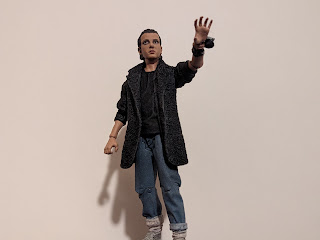The thing that kept running through my head at a crucial yet objectively silly moment in the middle of this objectively silly story is there must have been a point when this was being planned and various members of the cast and crew were meeting with the director to ask how he wanted to handle the sequence in question. The design of the movie is fundamentally whimsical with flourishes of expressionism, it's all of course based on a children's book, and - I really can't stress this enough - the crux of the story hinges on the sort of ridiculous, bizarre revelation that defines Dahl's writing. And all I can imagine watching the finished film is director Matthew Warchus must have thought about for a moment and said something along the lines of, "Fuck it. Act like it's Shakespeare."
Because as silly as the premise, backstory, and designs are, as absurd as some of the cartoon physics and musical numbers get, the heart of this adaptation keeps returning to emotionally rich sequences built on honest depictions of trauma, hope, and pain. It's the kind of gambit directors rarely make in these kinds of movies, because when they don't work, the result is a mess of conflicting tones and melodrama. But in the rare circumstances it does work, you end up with the sort of bizarre, operatic masterpieces generations remember for the rest of their lives. The Last Unicorn, The Secret of N.I.M.H., Watership Down, Coraline... and now Roald Dahl's Matilda: the Musical.
I'm honestly not sure whether or not this will obtain the kind of cultural saturation to leave that kind of legacy behind, given the transitory nature of Netflix's business model. They don't really do much to promote their films, so this could end up buried in a week or two under the weight of their next eighty additions. But the kids who see this now are going to remember it. This is the right blend of nightmare fuel, honest emotion, and weird visuals that can set up shop inside a kid's head and lead them into a life of art.
Or maybe turn them into revolutionaries, because the politics of this thing aren't subtle. The movie shrugs off the adage "two wrongs can't make a right," then responds with a feature-length metaphor about how all methods of resistance are justified in the fight against fascism. Lies, subterfuge, violence, psychological warfare... whatever it takes. I haven't read the book this is based on since... I don't know... third grade maybe? So I honestly don't know how much of that subtext appeared in the original. My guess is it was there, but for a variety of reasons, it most likely wasn't obvious. Here, it's barely subtext. Kids probably won't entirely understand the message at first, but it could very well stick with them (fingers crossed).
There are several reasons this works, beyond the fact it's directed well. The cast deserves a great deal of credit here, particularly Alisha Weir and Lashana Lynch, who play Matilda and Miss Honey. Together, they form the emotional center of the movie, and this would have failed if either hadn't been able to convey real depth at several key moments. Emma Thompson should also be celebrated, as she delivers a phenomenally over-the-top villainous performance in a mech suit's worth of Oscar-caliber prosthetics and makeup. The movie could probably still have worked without her, but it wouldn't have been as much fun. The whole ensemble is good, really, including a small army of children who sell some elaborate song and dance scenes.
Speaking of, the songs are good. I realize that's a carryover from the play, but that doesn't change the fact it's enjoyable to listen to. More importantly, the music manages to enhance tone, develop themes, and add depth to the characters' emotional journeys: you know, all that stuff songs are supposed to do in musicals.
I should note my wife, who has an actual background in theater, detected artifacts where songs were likely cut down or references were omitted. She still liked the movie, but wasn't quite as impressed as I was.
I should also mention some minor characters felt underutilized. Matilda's classmates, in particular, felt more like references to the book than characters in their own right. I don't consider this a major flaw, but it's one area where the movie could have used more time. Fingers crossed for an extended cut, I suppose.
Regardless, this is a fantastic movie. I really hope kids discover it: this is the kind of movie a generation could watch when they're seven and find themselves discussing in college.






